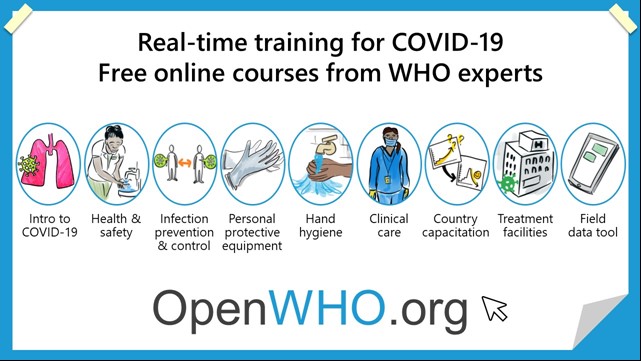GFMER collation of specific WHO online courses on COVID-19
OpenWHO is WHO’s new interactive, web-based, knowledge-transfer platform offering online courses to improve the response to health emergencies. It has a mobile app, for both iOS and Android devices, and can also be viewed via the internet browser.
Specific courses by OpenWHO on COVID-19 are listed below and some of them offer a certificate. Please click on the URL link or copy and paste the link to open the course of your interest.
- Infection Prevention and Control (IPC) for Novel Coronavirus (COVID-19)
This course provides information on what facilities should be doing to be prepared to respond to a case of an emerging respiratory virus such as the COVID-19, how to identify a case once it occurs, and how to properly implement IPC measures to ensure there is no further transmission to HCW or to other patients and others in the healthcare facility. - Standard precautions: Hand hygiene
Most health care-associated infections are preventable through good hand hygiene – cleaning hands at the right times and in the right way. This module has been prepared to help summarize the WHO guidelines on hand hygiene, associated tools and ideas for effective implementation. - COVID-19: How to put on and remove personal protective equipment (PPE)
It aims to show the type of personal protective equipment or PPE needed to correctly protect oneself. PPE is part of a larger infection prevention and control bundle of measures and should be implemented as part of a multimodal strategy of management of COVID-19 patients. - Emerging respiratory viruses, including COVID-19: methods for detection, prevention, response and control
COVID-19 was identified in 2019 in Wuhan, China. This is a new coronavirus that has not been previously identified in humans. This course provides a general introduction to COVID-19 and emerging respiratory viruses. - Seasonal influenza: Introduction
Seasonal influenza is an acute viral disease of the respiratory tract transmitted via aerosols or contaminated surfaces from infected people. This course provides a general introduction to the disease. - Clinical Care Severe Acute Respiratory Infection (SARI)
It provides Clinical Care Training for Severe Acute Respiratory Infection (SARI). - Severe Acute Respiratory Infection (SARI) Treatment Facility Design
The SARI Facilities training package has been developed to meet the operational needs emerging with the COVID-19 pandemic. It provides a thorough understanding of the principles driving the design process of COVID-19 screening areas for health care facilities, community facilities and SARI treatment centres, including how to repurpose an existing building into a SARI treatment centre. - ePROTECT Respiratory Infections
All personnel responding to outbreaks of Acute Respiratory Infections (ARIs) need to have the basic knowledge and skills to mount an effective response. They need to understand what ARIs are, how they are transmitted, how to assess the risk of infection and to understand basic hygiene measures to protect themselves. - Simulation Exercise Management: Introduction
This course is an introduction to simulation exercises and their value as part of wider emergency preparedness to raise awareness among a non-technical audience. The goal of this course is to support the development and management of an effective fit-for-purpose exercise programme, by providing consistent practical guidance and tools on exercise design and implementation. - COVID-19: Operational Planning Guidelines and COVID-19 Partners Platform to support country preparedness and response
In order to assist UN country teams in scaling up country preparedness and response to COVID-19, WHO has developed these learning modules as a companion to the Operational Planning Guidelines to Support Country Preparedness and Response. - Pandemic Influenza Vaccines: National Deployment and Vaccination Plans
National deployment and vaccination plans for pandemic influenza vaccines are national tools which ensure that during a pandemic, processes and structures are functional so that vaccines are rapidly deployed and administered to target populations. - Health Cluster Coordination
As the number, scale and severity of humanitarian and health crises continues to increase, so does the need for effective Health Cluster leadership and coordination and to ensure that timely, high quality and impactful learning and training activities are available to Health Cluster/Sector teams, partners and health focal points at the global, regional and country level. - Management and Facilitation of an After Action Review (AAR)
An AAR is a qualitative review of actions taken in response to an event of public health concern. It is a means of identifying and documenting best practices and challenges demonstrated by the response to the event. - Risk communication essentials
Risk communication is a core public health intervention in any disease outbreak and health emergency. It refers to the real-time exchange of information, advice and opinions between experts, officials and people who face a threat to their wellbeing, to enable informed decision-making and to adopt protective behaviors. - Ready4Response Tier 1: Response context and principles
Tier 1 provides context and principles of the all-hazards approach to emergency response, outlining the various actors involved, their roles and structural relationships. It also examines in-depth WHO's role in response, and discusses core ethics and principles all responders must follow. - Ready4Response Tier 2: Systems, structures and skills
Tier 2 focuses on the Incident Management System (IMS) and its core functions. It also examines core skills required to work effectively in a response team and describes the basic principles of risk management. - Clinical management of patients with COVID-19: Investigations and care for mild, moderate and severe disease
This course of the Clinical Management of Patients with COVID-19 course series provides an overview of the management strategies in caring for patients with mild, moderate, and severe COVID-19. ‘Laboratory considerations in COVID-19’ and ‘Imaging in COVID-19 and ‘Oxygen therapy via nasal cannula and face masks.
